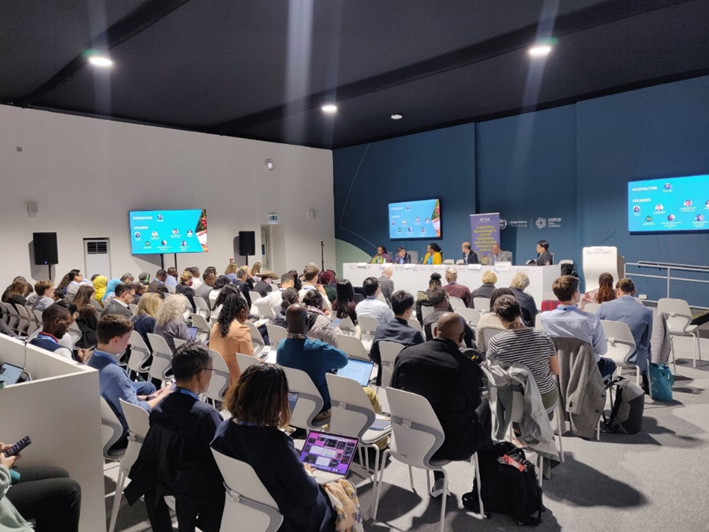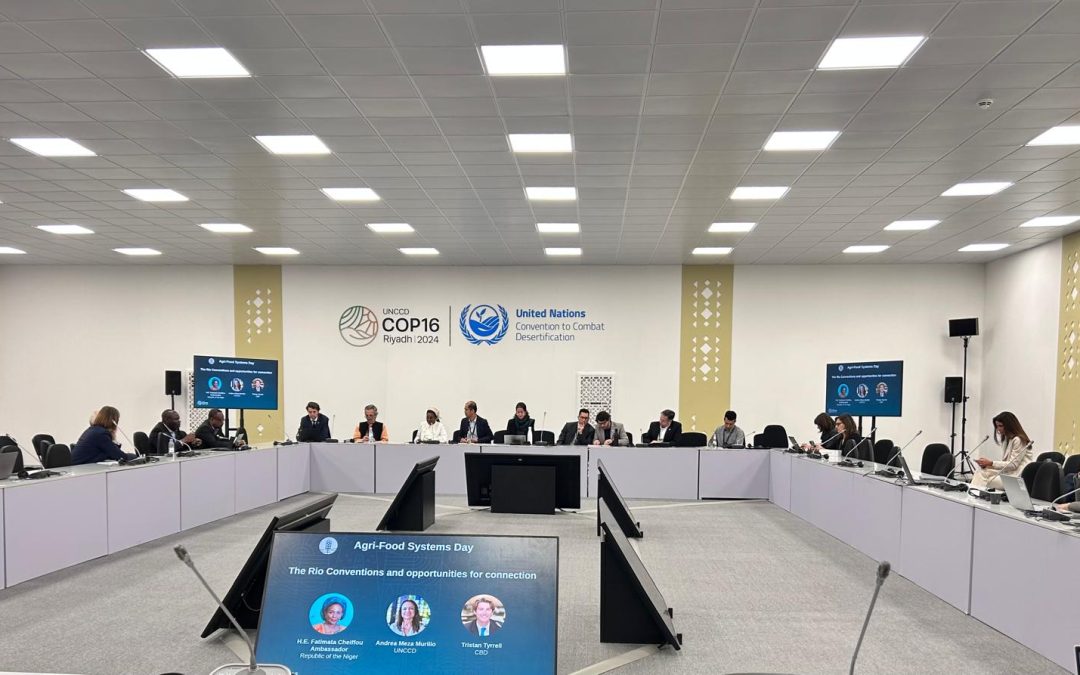Article by Oliver Oliveros, Coordinator of the Agroecology Coalition
This article was firstly published by FAO Agroecology Knowledge Hub
Agriculture impacts and is affected by climate change. Many current agricultural practices rely heavily on industrial methods such as monocropping, overreliance on synthetic fertilizers, and harmful use of antibiotics to maximize production. This results in about 1/3 of greenhouse gas emissions, 80% of biodiversity losses, and use of up to 70% of freshwater resources.
Climate change, biodiversity loss and land degradation are closely interrelated. If global warming is not limited to 1.5C, climate change will likely become the dominant cause of biodiversity loss in the coming decades (ELD Initiative, 2022). Land degradation typically results in biodiversity being lost and is a major contributor to climate change. Land degradation and the loss of intact ecosystems also changes and disrupts rainfall patterns and exacerbates extreme weather like droughts or floods thus amplifying the impacts of climate change.
None of these three global challenges can be effectively addressed in a siloed manner. Climate, biodiversity and land targets – the targets of UNFCCC, CBD and UNCCCD, as well as the 2030 Sustainable Development Agenda – hence can only be achieved together.

Agroecology as a dot-connector
And this is where agroecology comes in. A powerful lever, agroecology provides sustainable solutions to issues of soil degradation, climate, biodiversity, food security and nutrition, including precarious livelihoods and social inequalities, faced by farmers and food system workers.
Land is one of the common interfaces of the three Rio Conventions. For instance, the Intergovernmental Panel on Climate Change’s Assessment 6 reports with high confidence that the “adoption of agroecology principles and practices will be highly beneficial to maintaining healthy, productive food systems under climate change. Also, Target 1 (on biodiversity inclusive spatial planning”) of the Global Biodiversity Framework’s (GBF) is linked to UNCCD decision encouraging parties to “foster and support integrated land use planning” as an “as an enabler of synergies, complementarities, and policy coherence among the Rio conventions and as a tool to achieve LDN targets.” Moreover, GBF Target 2 (on ecosystem restoration) is connected to a UNCCD COP decision that encourages parties to “implement land and ecosystem restoration.”
Also common across the three Rio conventions is the promotion of nature-based solutions and ecosystem-based approaches. GBF Target 10 recognizes agroecology as contributing to the resilience and long-term efficiency and productivity of production systems and to food security, conserving and restoring biodiversity and maintaining nature’s contributions to people, including ecosystem functions and services.
These connections need to be translated into national action frameworks, i.e., the Nationally Determined-Contributions (NDCs) under the UNFCCC, the National Biodiversity Strategy and Action Pan (NBSAP) under UNCBD and the Land Degradation and Neutrality (LDB) under the UNCCD.

Tools and guidance in support of Action planning
To this end, a number of Agroecology Coalition members have embarked on the development of tools and guidance in support of countries’ articulation of their respective national commitments.
For instance, the “Boosting Biodiversity Action Through Agroecology: Guidance for developing and updating NBSAPs” was developed to guide Parties of the CBD in developing sound and comprehensive NBSAPs that leverage agroecology’s ability to address the biodiversity crisis and provide multiple co-benefits for climate adaptation and mitigation, food security, health and nutrition, ecosystem resilience, sustainable livelihoods, social cohesion, preserving cultural heritage, and protecting human rights.
Another guide is the “Food Forwards NDCs” which is a consolidated collection of guidance in more than 30 specific areas of food systems transformation, organized across five priority areas – namely, food environment, food governance, food production, food supply chains and food consumption. The content can be used to identify relevant policy options, implementation measures, their climate and sustainable development benefits, potential trade-offs and examples of their implementation in practice. There is a section on Mainstreaming agroecology principles in food governance
There is also the Biodiversity and Climate Action in Agriculture and Food Systems report which explores connections between food, climate, and biodiversity, explaining how agriculture and food systems are integrated into international biodiversity and climate policy processes, and outlines opportunities for aligning these efforts. It emphasizes the need for integrated, systemic solutions that tackle both the climate and biodiversity crises through more sustainable and resilient food systems.
Growing space for agroecology and food systems
Ten years since the first FAO International Agroecology Symposia, we are seeing a growing space for agroecology in the global policy arena. What was once a topic that attracted only civil society is now getting the attention of policy makers both globally and nationally. Organizations and networks in support of agroecology have flourished, producing various research and knowledge products, policy initiatives, declarations, strategies, programmes and initiatives on the ground.
Various global reports have recognized the role agroecology can play in transforming our food systems towards sustainability: Committee on World Food Security’s High-Level Panel of Experts on Food Security and Nutrition (2019, 2020), International Panel of Experts on Sustainable Food Systems (IPES-Food, 2016; 2019,..), IPBES reports (on land degradation 2018, on Biodiversity 2019), TEEB for Agriculture and Food 2018, IPCC report on CC & land 2019, IPCC report 2022.
The UN system is increasingly recognizing the role of food systems in solving the global crisis we currently face. The 2021 Food Systems Summit is a testament to this, elevating the food systems agenda even further within the UN agencies. This is complemented by counter-Summits organized by civil society actors who are pushing for transformative actions anchored on right to food and food sovereignty.
Last year, at COP28, around 160 countries endorsed the COP28 UAE Declaration on Food Systems, Resilient Agriculture and Climate Action which, among others, calls on the integration of agriculture and food systems into National Adaptation Plans, Nationally Determined Contributions, Long-term Strategies, National Biodiversity Strategies and Action Plans, and other related strategies. This is complemented by the Non-State Actor’s Call to Action for Transforming Food Systems signed by more than 200 organizations (and is still open for endorsement), calling for the ambitious implementation of the UAE Declaration, reinforcing the vital role that governments play in creating the conditions for ambitious action by all those involved in food systems.
According to the Food Forward NDC analysis, some 137 countries have reflected food (and around 20 have reflected agroecology) in one form or another in their respective NDCs as of now. From Asia to Africa to Latin America, countries are developing their National Agroecology Strategy. Tanzania launched its National Agroecology Strategy (NEOAS) earlier this year with Kenya and Uganda poised to do the same towards the end of the year. In Asia, ASEAN Member States, coordinated by the Lao-facilitated Initiative on Agroecology for ASEAN (LICA), and in partnership with the French Agricultural Research Centre for International Development (CIRAD), the United Nations Economic and Social Commission for Asia and the Pacific (ESCAP), and the Food and Agriculture Organization of the United Nations (FAO), recently launched the Policy Guidelines for Agroecology Transitions in ASEAN, which mark a critical step forward in ASEAN’s commitment to sustainable, resilient, and equitable food systems. In October, Brazil launched their National Agroecology Strategy (PLANAPO) during the World Food Day while Colombia launched theirs during Biodiversity COP in Cali. And if country membership to the Agroecology Coalition were to be used as indicator, we now have 50 countries joining, which is more than double since the launched of the Coalition in 2021.

Towards sustainable transformation through agroecology
The case for transformation has never been more relevant, with a great diversity of actors calling for a shift towards more diverse, integrated, resilient, and equitable food systems, while adapting practices to ensure that all people have access to healthy diets and food environments.
For far too long, we have waited for agroecology to gain global recognition of its transformative potential. At this moment there is a key opportunity to support food system transformation by combining change in finance, policy and practice. In taking this path, we have the 13 principles aligned with 10 elements of agroecology serving as our compass to guide us in our collective journey towards the transformation that we all want to see.

